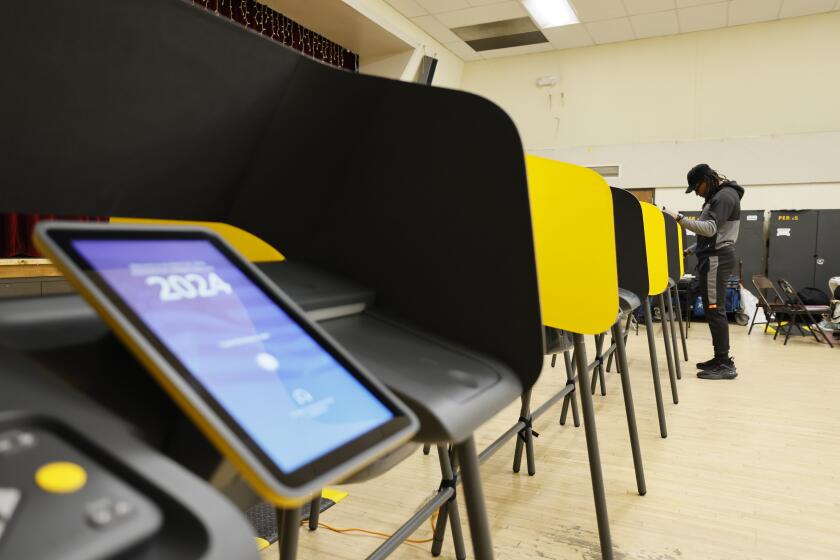THE STATE BUDGET CRISIS : State Faces Prospect of Issuing IOUs to Pay Bills : Government: Registered warrants will replace checks Wednesday if Gov. Wilson and Legislature fail to resolve fiscal impasse. Step would likely hurt bond rating.
Not since the Great Depression has California been forced to issue IOUs in place of checks to pay what it owes to government workers, county welfare agencies, doctors and hospitals, and others who provide government with needed products and services.
But the state will have little choice but to do just that Wednesday unless Gov. Pete Wilson and the Legislature are able to reach agreement on handling a record $10.7-billion shortfall by adopting a budget for the new fiscal year that begins July 1.
Called registered warrants, these IOUs look like state checks. And because banks are expected to cash them for regular customers, they may even act like state checks. And yet they won’t be checks at all, but interest-bearing IOUs.
In just the first two days of July, the state could issue as much as $182 million in these warrants, to be used to pay individual and corporate tax refunds, bills for Medi-Cal patients, utility bills and rent.
The warrants would pay interest at an annual rate of 5% to those who hold onto them until the state can redeem them. A month’s worth of the IOUs could cost the state $10 million in interest.
Unless there is a budget agreement, the number of IOUs would accelerate day by day until over 800,000 of them would have been issued by July 31, when most state employees are due to be paid.
Although there could be inconvenience for individuals and businesses that receive them, the primary impact of the IOUs will be on the state itself. They are a public sign of the depth of the state’s financial woes and the difficulty that the governor and the Legislature have in resolving the trouble.
State Controller Gray Davis, who often clashes with the Republican Administration, said he knows of no other state in the country that is considering replacing checks with IOUs to pay its bills.
“The real problem comes from the perception that California can’t get its act together,” said Davis, who has announced that his office will begin printing the first of the registered warrants today.
IOUs will be “an absolute embarrassment” to the state, Davis said. “We pay for that scenario because some reduction in California’s credit rating is almost certainly going to occur.”
State Treasurer Kathleen Brown, another Democrat, said that some individuals--those who do not have regular accounts with banks, S&Ls; or credit unions--could have difficulty cashing the warrants. “I have grave concerns about those at the bottom of the economic totem pole,” she said.
And beyond those short-term problems, she said, are serious long-term complications. “It admits that the state political leadership lacks the resolve to manage our fiscal difficulties,” Brown said.
Like Davis, Brown predicted that issuing the warrants could lead to a further drop in the state’s credit rating, which in turn would add to the cost of financing bonds. And once fallen, bond ratings are unlikely to rise again very soon, she said.
The last time that the state was forced to replace regular payments with IOUs was in 1936, when the country was mired in the Great Depression, according to the controller’s office.
In fact, it has been so long since the state has had to deal with the problem that government experts have had to dig deep into musty archives to find documents that explain the legal technicalities of issuing the IOUs.
The last time that the state came this close to issuing the warrants was in 1983, during another state fiscal crisis. At the time, then-Controller Ken Cory was prepared to start mailing out IOUs instead of checks, but at the last minute the cash was found to make them unnecessary. About a dozen or so were mailed out by mistake, but they were called back the same day.
A combination of factors has led the state to the brink again. During the fiscal year that ends today, revenues fell far short of expenses--leaving a deficit estimated at $4 billion. To obtain the cash to continue paying bills this year, the governor authorized the sale of $475 million in notes.
That money was only intended to keep payments current through the end of June, including the wages of all state workers.
However, bills from the current fiscal year will continue to fall due over the next few months. And without a budget that resolves this year’s deficit, those bills will have to be paid with registered warrants.
Beginning Wednesday, in the new fiscal year, the state will only pay the bills that it has to unless there is a budget agreement.
Payments that are required by the state Constitution--for schools, the universities, and debt service--will be paid by regular checks backed by incoming revenues.
And even in the absence of a budget agreement, the courts have ordered the state to keep sending registered warrants, or IOUs, to the counties to run welfare programs and to doctors and hospitals to pay for the care given to low-income patients under Medi-Cal. For the same reason, state workers are likely to be paid as well.
There is general agreement that, just as in the Depression years, California will make good on its IOUs.
And financial institutions will most likely treat those that are received from most customers as if they were regular checks.
“Most banks in the state will honor them for regular retail customers,” said Nancy Badely, a spokesperson for the California Bankers Assn.
However, if the state budget impasse drags on, that could change.
Financial institutions that cash IOUs for customers would be forced to hold onto them. In effect, the banks would be loaning the state the money, Badely said. And, she added, if the crisis continued until the end of July, it would be like “taking $1.5 billion out of the banking system.”
Payment Plan: If the Legislature and the governor are unable to agree on a state budget by Wednesday, the state plans to pay its debts with registered warrants, which are in effect interest-bearing IOUs. It would be the first time since the Depression that such warrants have been used by the state. The language on the back of the warrant makes it clear that the state cannot pay out the funds until a date advertised by the state treasurer. Here is a sample:
This warrant, PRESENTED to and REGISTERED by the State Treasurer under Government Code Sec. 177221 on the date shown on the face of the warrant, is not paid for want of funds and bears interest at a rate per annum fixed pursuant to Gov. Code Sec 17722 from the date of such registration to and including the date upon which the State Treasurer first advertises that said warrant is payable upon presentation. CALIFORNIA STATE TREASURER
More to Read
Get the L.A. Times Politics newsletter
Deeply reported insights into legislation, politics and policy from Sacramento, Washington and beyond. In your inbox three times per week.
You may occasionally receive promotional content from the Los Angeles Times.






